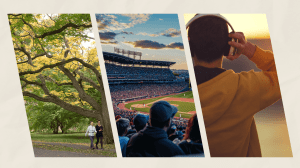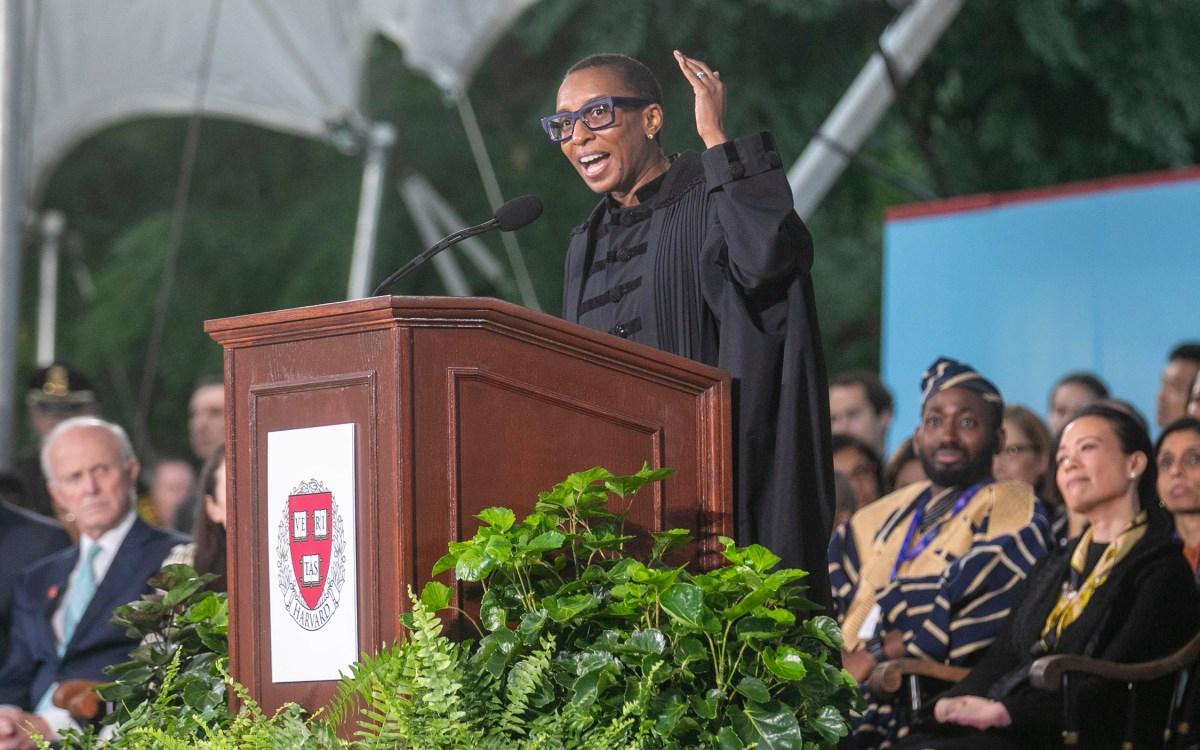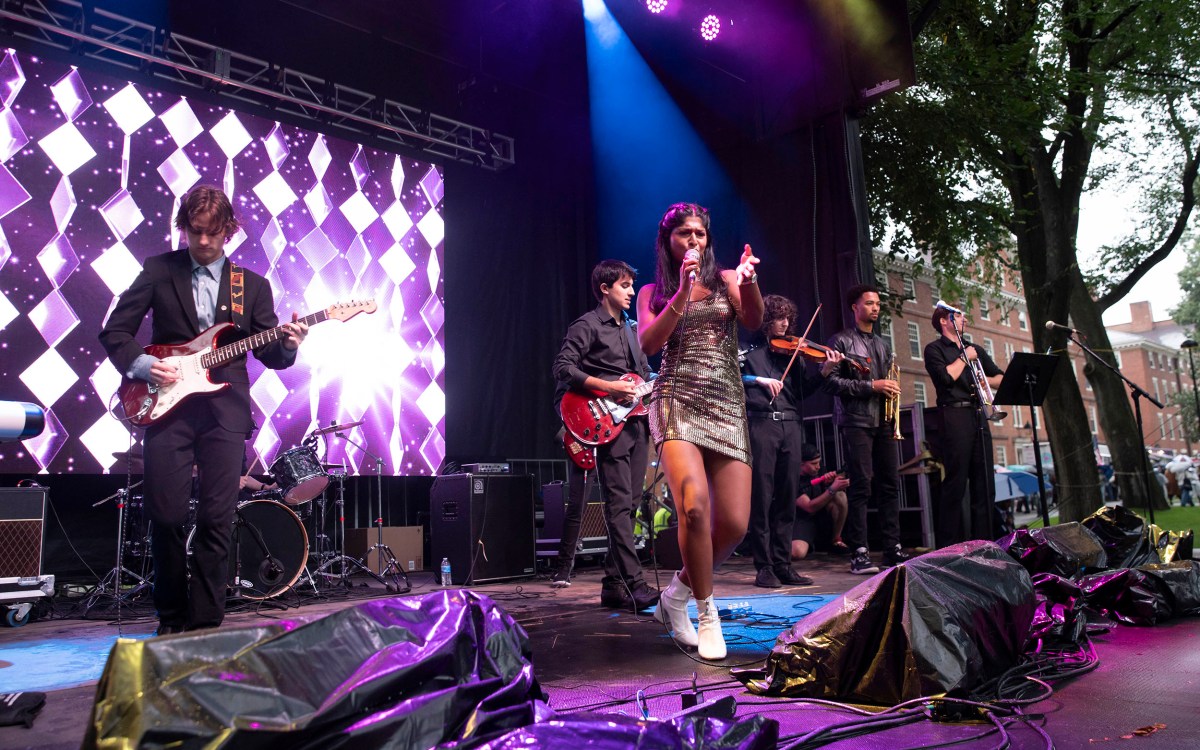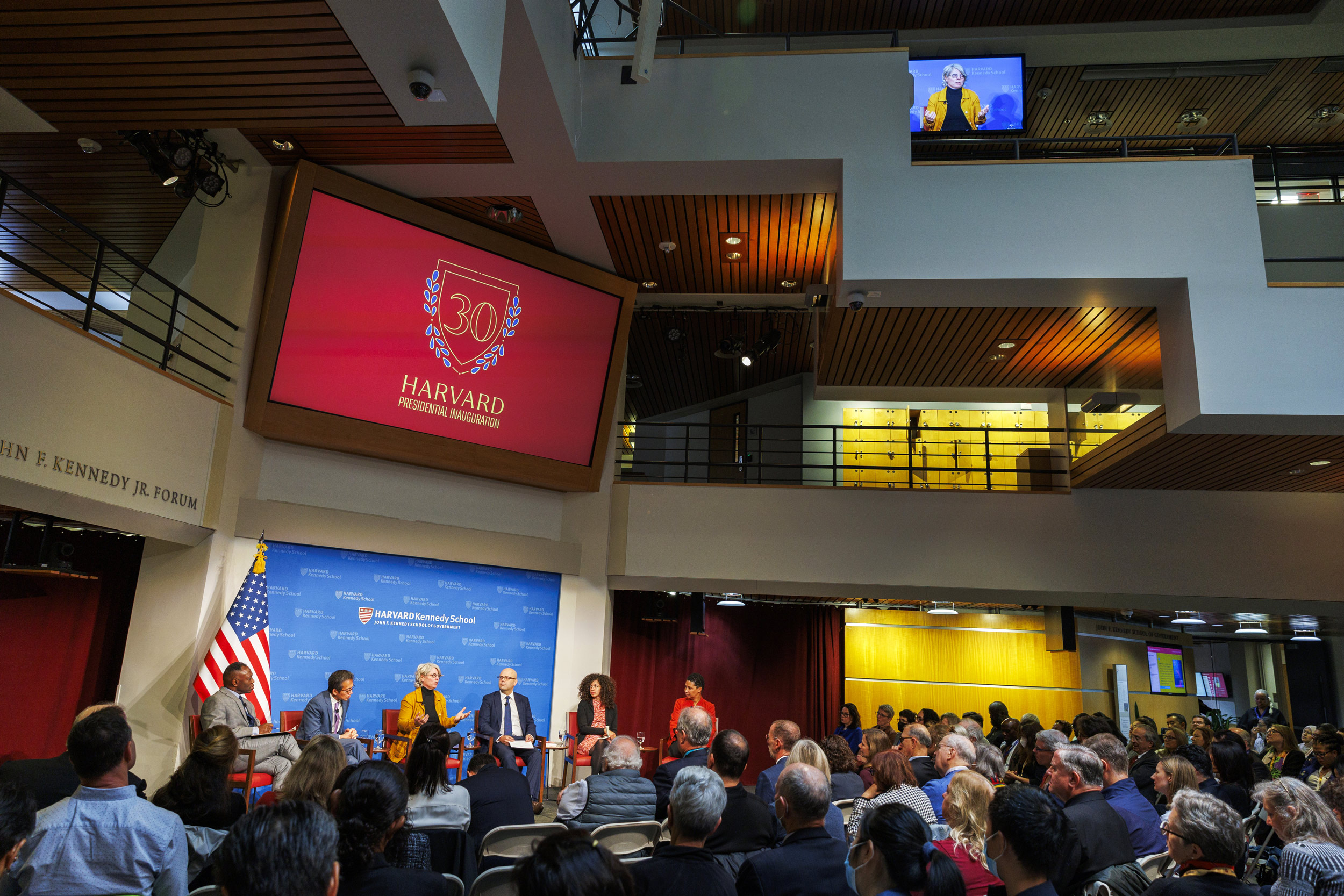
“Revitalizing Democracy” was one of six symposia included in the inauguration celebration. It featured moderator Guy-Uriel Charles (from left), Archon Fung, Jill Lepore, Daniel Ziblatt, Yanilda Gonzalez, and Danielle Allen.
Stephanie Mitchell/Harvard Staff Photographer
Taking aim at global solutions
Panels examine challenges ahead: riven democracies, biomedical advances, raging inequity, climate change, harnessing AI, role of academy
As democracies around the world grow increasingly divided with the rise of various anti-democratic forces and nationalist-populist movements, a group of Harvard scholars gathered Friday morning to assess the state of democracy in the U.S. and propose ways to revitalize it to ensure it best serves 21st-century America.
The event, titled “Revitalizing Democracy,” was one of six academic symposia that took place Friday across the University as part of President Claudine Gay’s inaugural celebration. Gay, a political scientist, has called “faltering” democracies one of the most pressing challenges the world faces. She said that seeking ways Harvard can join with the global community to find solutions is a priority for the University.
During a discussion at the John F. Kennedy Jr. Forum at Harvard Kennedy School led by moderator Guy-Uriel Charles, Charles Ogletree Jr. Professor of Law at Harvard Law School, faculty panelists identified some of the difficulties American democracy faces today.
Among the issues that panelists cited are an outdated reliance on institutions like the Electoral College, the U.S. Senate, and the filibuster that permit a minority to thwart the will of the majority, and foreign actors and nation-states targeting the American electorate with threats and false information designed to widen political and cultural divisions and weaken consensus on democratic principles.
Many of the problems have been gradually emerging over time amid changes in population through immigration, shifts to a global economy, and the rise of digital technology.
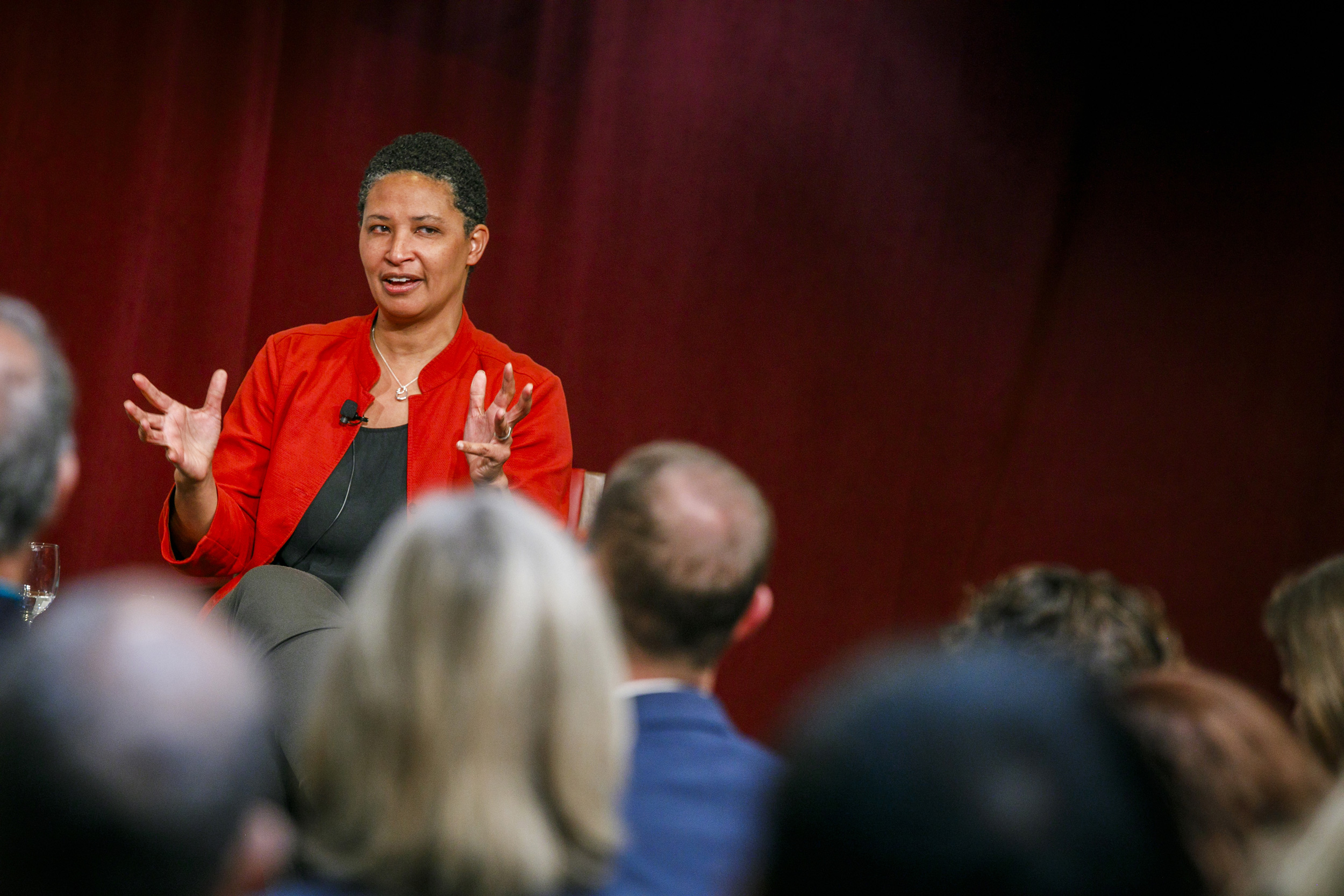
Danielle Allen, James Bryant Conant University Professor, and director of the Allen Lab for Democracy Renovation, said passage of immigration laws in the 1960s, the emergence of social media and structural reforms to both political parties in the 1950s have resulted in “unintended consequences” that affect our democracy today.
Some of the panelists noted that the country has only been a true multicultural democracy since the Voting Rights Act passed in 1965, while the Constitution, written by and for a white minority eligible to vote, has remained largely untouched since the Civil Rights era.
The “outsized” and very different experience that communities of color often have with policing compared to white communities fuels misperceptions about the state and crime and hardens fear-driven partisanship, said Yanilda González, assistant professor of public policy at the Kennedy School.
The panel offered ideas for how the Harvard community, particularly faculty and students, can start to dismantle these barriers and strengthen democracy so that it more fairly and equitably serves the changing America populace.
Archon Fung, Winthrop Laflin McCormack Professor of Citizenship and Self-Government and director of the Ash Center for Democratic Governance and Innovation at HKS, said research has shown that frequent face-to-face interactions between people with very different political views reduces polarization and will foster a “culture of democracy” in which disagreement is welcome and partisanship is not, so focusing more effort on bridging political gaps at the local or state level is critical.
Jill Lepore, David Woods Kemper ’41 Professor of American History and Harvard College Professor, suggested an amendment to the Constitution that would impose term limits on Supreme Court justices at some future, mutually agreed upon date, could be an effective way to eliminate lifetime appointments, which partisans on both sides agree in principle runs counter to democratic practice, and to demonstrate that changes to the Constitution are necessary and possible.
Academic institutions, like Harvard, ought to begin working now to identify the models that can best move U.S. political institutions forward so that they truly support our multicultural democracy, said Daniel Ziblatt, Eaton Professor of the Science of Government at Harvard University and director of the Center for European Studies.
“The ideas are already there,” Ziblatt said. They just require time and attention to refine them so they’re ready to be implemented when the time comes, much like was done following World War II to establish institutions like the United Nations and the International Monetary Fund.
“If we just sort of hold off until the moment is ‘realistic,’ then we won’t be ready when the moment comes.”
“Innovating for Impact: Science for the Mind and Body in the 21st Century”
Another panel, moderated by Amy Wagers, the Forst Family Professor of Stem Cell and Regenerative Biology and the co-chair of the Department of Stem Cell and Regenerative Biology, discussed Harvard’s biomedical research and the field’s untapped potential in improving health outcomes for billions around the world.
“I really wanted to highlight the many facets of innovation that are needed to realize the full potential of biological discoveries, spanning from the first arc of an idea to the experiments in their early days to the discoveries — and ultimately their application — in the real world,” Wagers said.
And the first step, all agreed, was to be unafraid to take leaps.
“We need to take big risks to solve hard problems,” said Kara McKinley, one of the panelists and an assistant professor at the Harvard Stem Cell Institute. McKinley leads a lab that seeks to advance regenerative medicine by studying a repair mechanism in the uterus that may offer insights into how we can harness natural processes to heal wounds. “Because in the end, this is really the goal, to create cures and to do science that is in service to humankind,” she said.
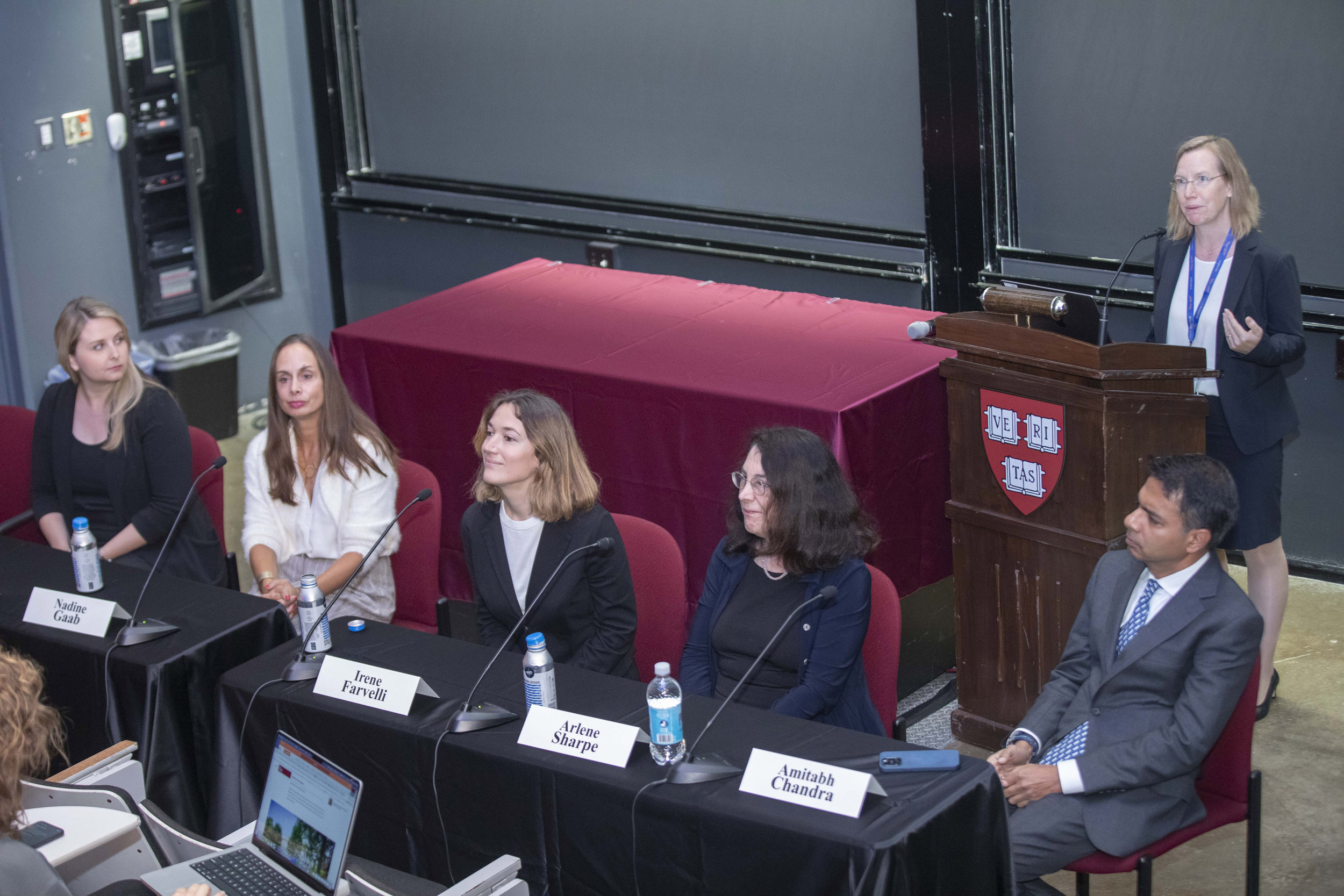
Moderator Amy Wagers (at podium) introduces panelists Kara McKinley (from left), Nadine Gaab, Irene Faravelli, Arlene Sharpe, and Amitabh Chandra at “Innovating for Impact: Science for the Mind and Body in the 21st Century.”
Kris Snibbe/Harvard Staff Photographer
During the event, panelists engaged with the attendees, asking questions and encouraging them to discuss ideas with the people seated next to them.
Arlene Sharpe is the Kolokotrones University Professor and chair of the Department of Immunology at Harvard Medical School. Her lab focuses on whether we can train our own immune cells to better fight infection and cancer.
Sharpe played a video of T cells delivering “the kiss of death” to cancer cells. She turned to the audience and said, “I could watch this all day,” eliciting chuckles around the room.
“One of the most exciting things about being at Harvard is the collaboration,” said Sharpe, who is also a member of the Broad Institute and the leader of the Cancer Immunology Program at the Dana-Farber/Harvard Cancer Center. “One of the things that kept me here all these years is the ability to work with people. Wherever my science takes me, there are wonderful collaborations that develop that enable us to work together.”
Other panelists included Nadine Gaab, an associate professor in the Graduate School of Education who specializes in developmental cognitive neuroscience as it relates to learning disabilities; Irene Faravelli, a neurologist and postdoctoral research fellow in the Department of Stem Cell and Regenerative Biology; and Amitabh Chandra, an economist and the Henry and Allison McCance Family Professor of Business Administration at Harvard Business School.
During the Q&A portion of the event, all panelists agreed that more investment in the broader science community is needed if we want to address some of the world’s most pressing health issues — and not just a greater commitment of dollars, but human investment.
“The impediment to missing innovations is no longer capital,” said Chandra, who is also the Ethel Zimmerman Wiener Professor of Public Policy and Director of Health Policy Research at Harvard Kennedy School of Government. “[B]ut the people who are capable of discovering them are not entering the life sciences.” Some of them, he noted, never make it to an institution of higher education because they lack the necessary economic and educational opportunities.
Harvard, according to Chandra, produces nearly 4 percent of the world’s basic science. As a significant producer of research, the University has a role to play in equipping current and future generations of scientists to further advance the boundaries of knowledge, especially scientists from historically underrepresented backgrounds.
“There is really an urgent need to increase the diversity of people who do science to make science look like the people that our science seeks to serve,” said McKinley.
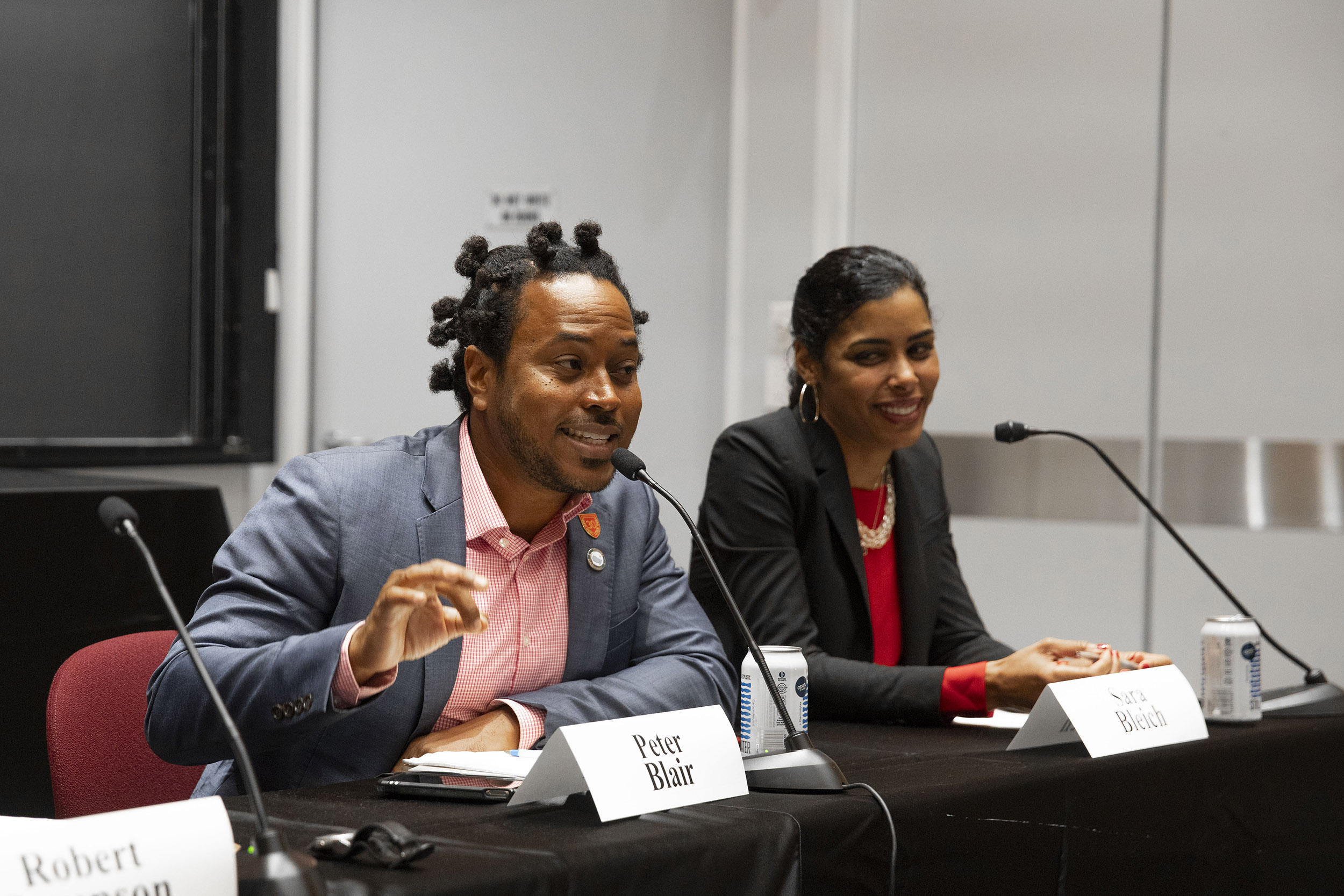
During the “Challenging Inequality in the US” panel discussion, Peter Blair shared his research on expanding labor market mobility for Americans who don’t have bachelor’s degrees.
Niles Singer/Harvard Staff Photographer
“Challenging Inequality in the US: New Ideas and Approaches”
Panelists who took part in an academic symposium on inequality in the U.S. urged the audience to fight inequality from their own trenches, in schools, neighborhoods, and their local associations.
Scholars can do research, compile and analyze data, and come up with theories about inequality. But, they noted, their work needs to be accompanied by the efforts of the community.
“Ideas matter for advancing real-world change,” said Sara Bleich, professor of public health policy at the T.H. Chan School of Public Health, who was the event’s moderator. “But this work requires collaboration.”
The key, said Crystal Yang, Bennett Boskey Professor of Law at Harvard Law School, is to look outside research institutions and go into the real world, and commit to work following truth and science.
Panelists shared with the audience how they became interested in studying inequality and, in some cases, how their personal life stories influenced their paths. They also talked about the policies and the practices they would like to see to advance their research.
Peter Blair, assistant professor of education at the Harvard Graduate School of Education, studies labor market discrimination, and the ways in which education can help workers who lack degrees achieve upper mobility. Blair spoke about his work with other researchers and policymakers to expand labor market mobility for the 70 million Americans who don’t have bachelor’s degrees.
“Research matters,” said Blair. “The way that we see people matters. The lens of thinking about who’s not in the room matters also. One of the phenomenal things about being at Harvard and specifically at the Ed School is that we value the basic research policy and its impact on practice.”
Robert Sampson, the Woodford L. and Ann A. Flowers University Professor, who studies crime, criminal justice, and urban inequality, spoke about the role of universities in research to promote social changes by including the voices of community members and understanding their lived experiences.
Imani Perry, who studies the history of Black thought, art, and imagination created in resistance to slavery and oppression, made a special plea to the audience.
“Identify an issue of injustice or inequality … [and devote the next two years] to spending some time on a regular basis on this issue,” said Perry, Henry A. Morss Jr. and Elisabeth W. Morss Professor of Studies of Women, Gender, and Sexuality and of African and African American Studies, and Carol K. Pforzheimer Professor, Harvard Radcliffe Institute.
“Even if it’s just those of us who are in this room, that would have a remarkably transformative effect. What we learn when we do scholarly research is that it’s the slow work that is the most transformative work. The same is true for social movement.”
* * *
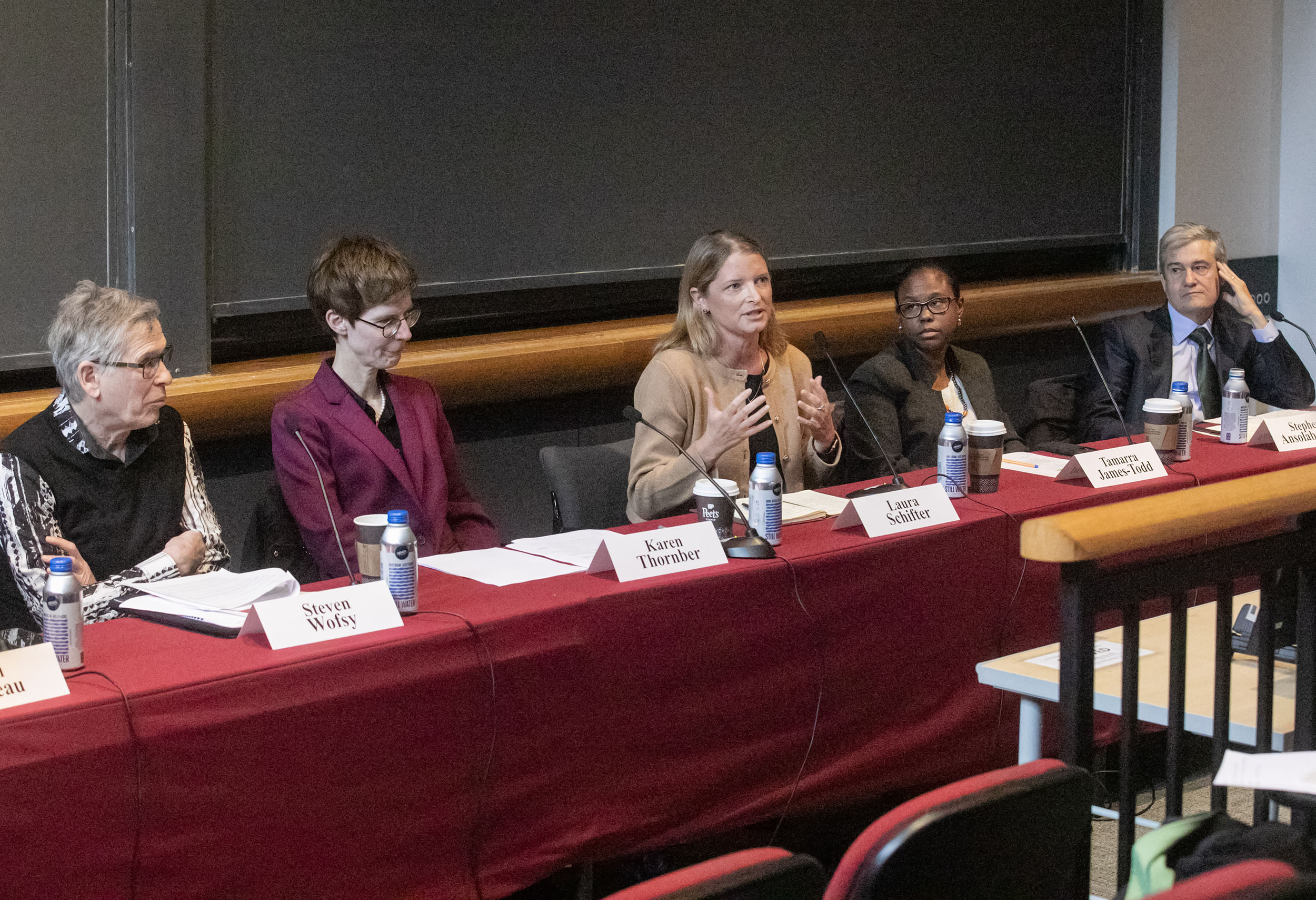
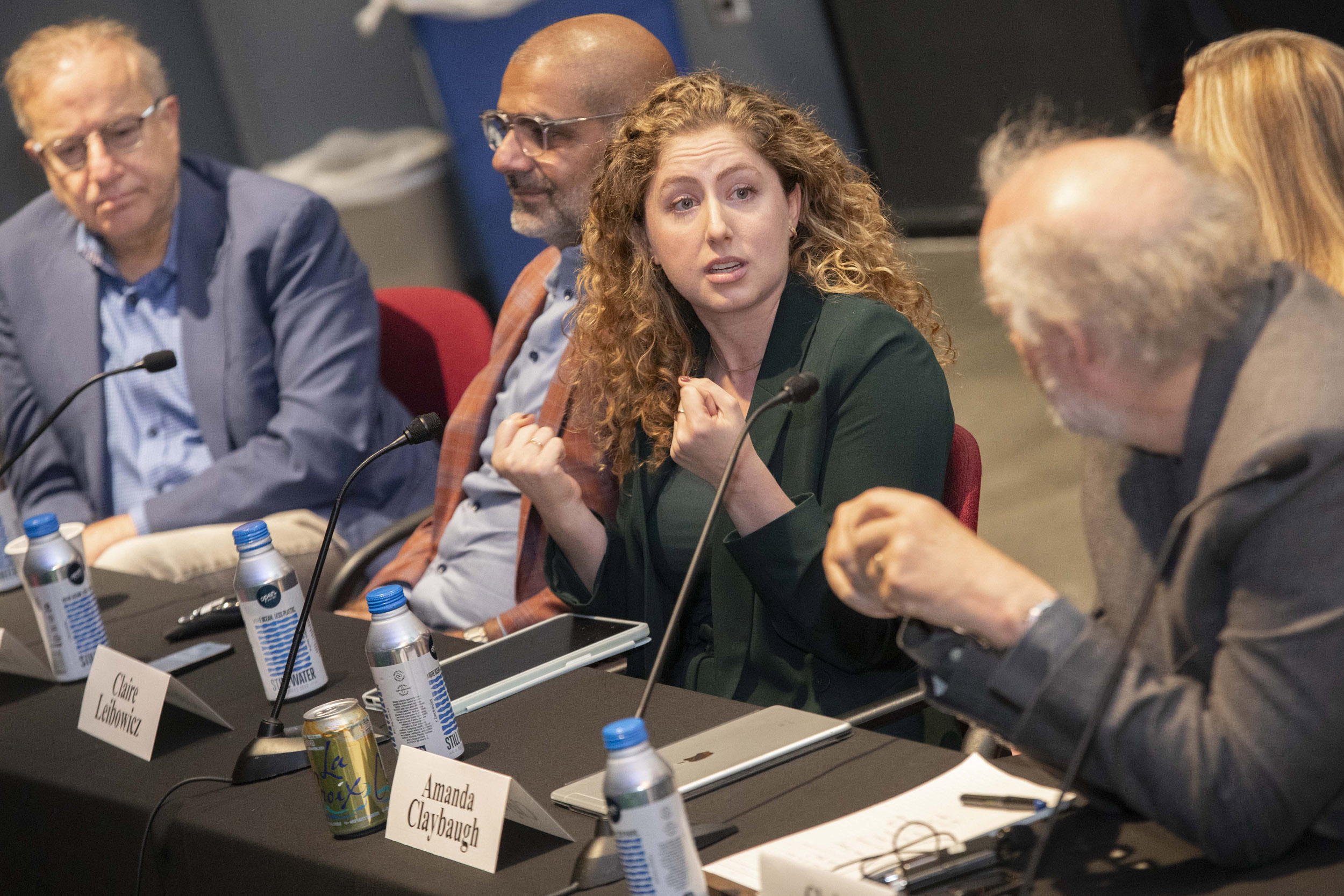
“Confronting the Impact of Climate Change: Building Resilience and New Solutions” featured panelist Steven Wofsy (from left), Karen Thornber, Laura Schifter, Tamarra James-Todd, and Stephen Ansolabehere. Panelist Claire Leibowicz shared her insights on “Harnessing Generative Artificial Intelligence for Learning, Teaching, and Working.”
Photos by Jon Chase and Kris Snibbe/Harvard Staff Photographers
There were three other panels marking the inauguration of Gay. Stephen Ansolabehere, Tamarra James-Todd, Laura Schifter, Karen Thornber, and Steven Wofsy discussed how leaders and communities can confront the far-reaching effects of climate change; Amanda Claybaugh, Isaac Kohane, Karim Lakhani, and Claire Leibowicz examined the potential for generative AI to transform labor and education; and Durba Mitra, Megan Panzano, Matthew Potts, and Louis Menand traded ideas about the role of academia in the face of new tech and global challenges.
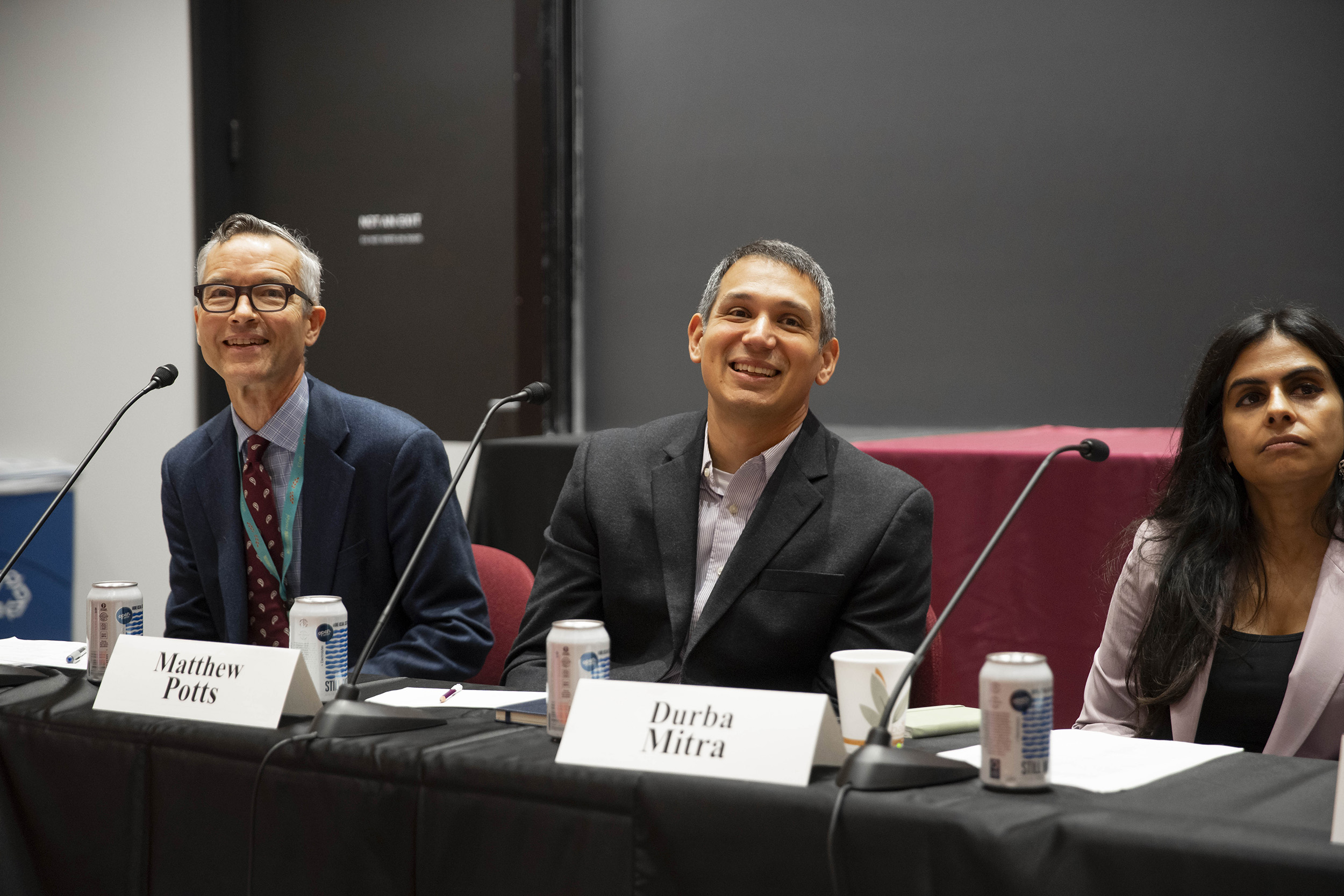
Robin Kelsey (from left), Matthew Potts, and Durba Mitra listen to an audience member’s question at the discussion, “Looking Ahead: The Future of the Academy.”
Niles Singer/Harvard Staff Photographer

